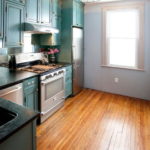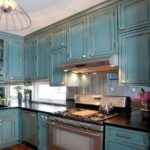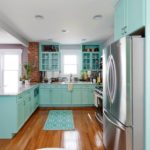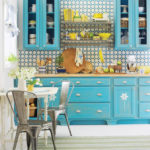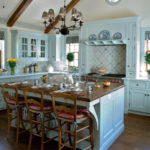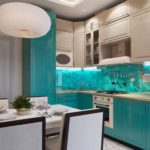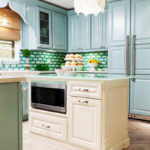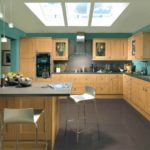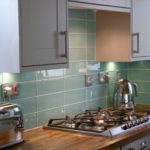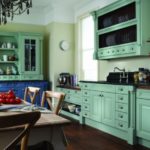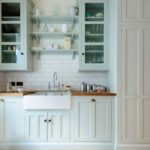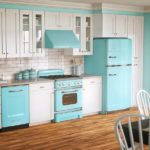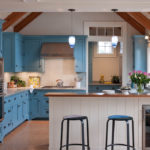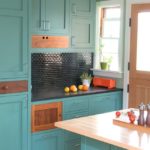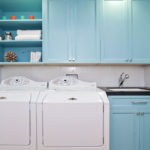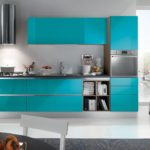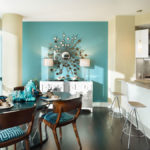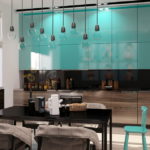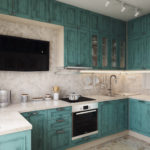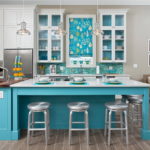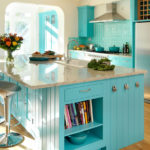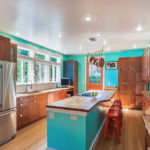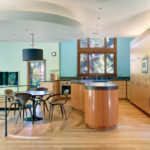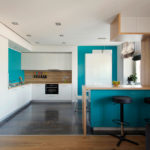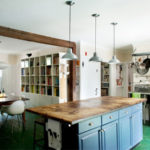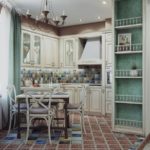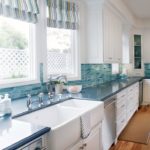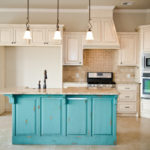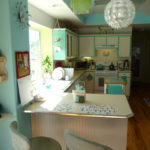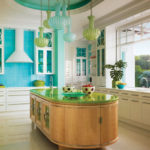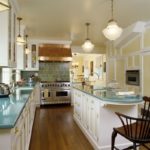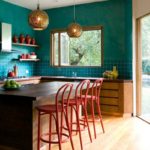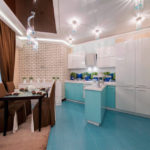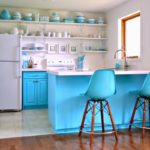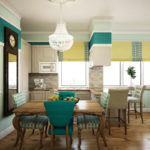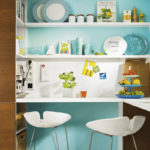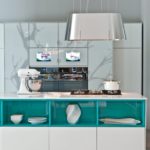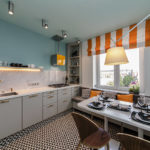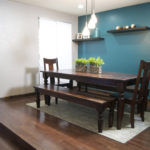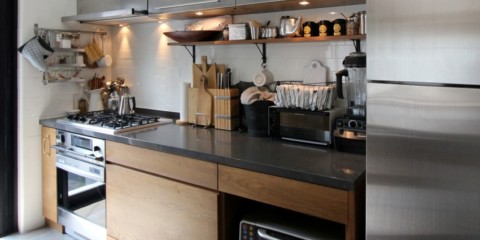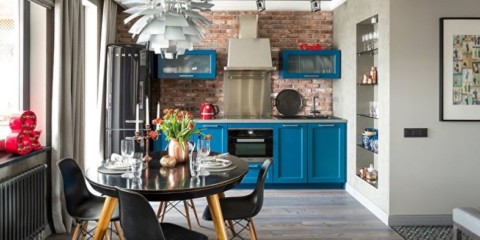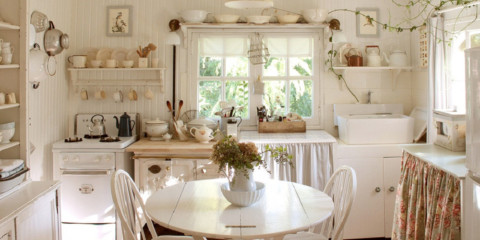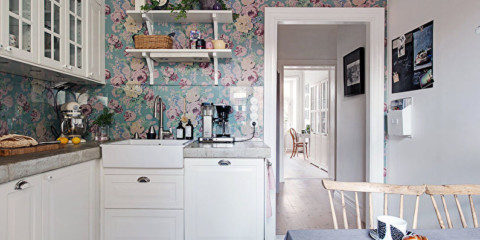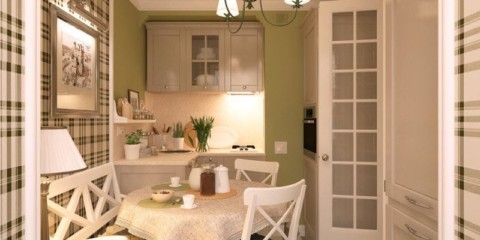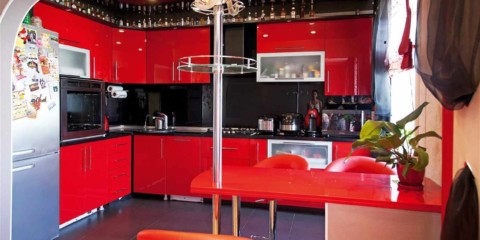 Kitchen
Red color in the design of the kitchen: advantages of use, design ideas
Kitchen
Red color in the design of the kitchen: advantages of use, design ideas
It is not often possible to find a turquoise color when decorating the interior of the kitchen. Although this tone is able to bring freshness and lightness to the space of the room. Choosing a turquoise color in the interior of the kitchen, it should be noted that the windows should face the sunny side so that the blue-green color does not seem too cold. If this is not possible, then it is necessary to use wooden surfaces or a warm tan decor as color splashes.
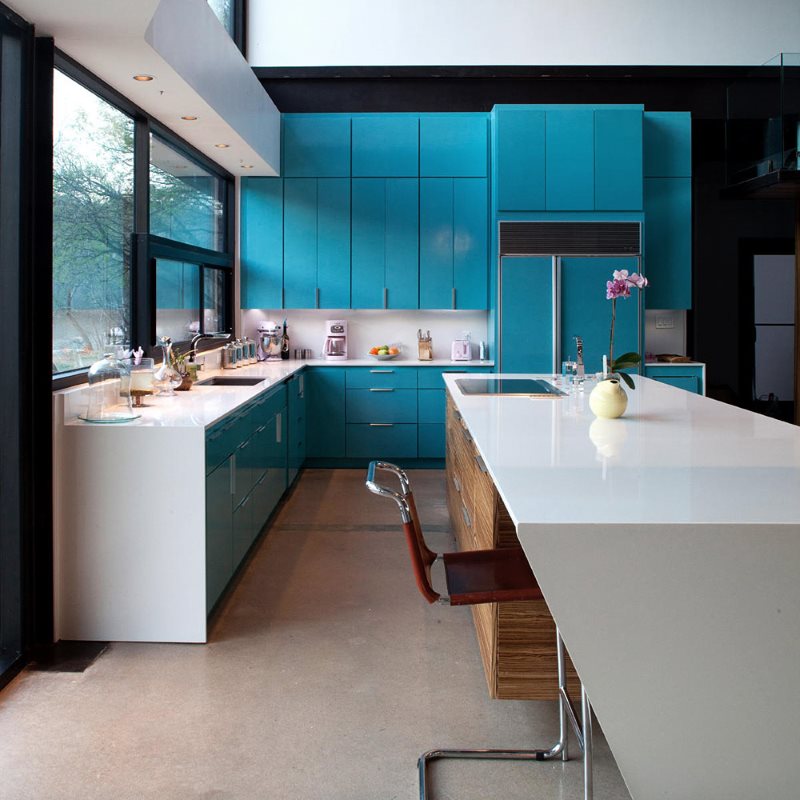
Turquoise color is associated with sky, sea, precious stones - all that pleases the eye and soul
It should also be borne in mind that turquoise cuisine is not suitable for every style. It goes well with modern style solutions, as well as with the Provence and Scandinavian styles.
Modern
Content
A distinctive feature of the modern style is conciseness, minimalism and restraint. The lines and surfaces that make up the space must be even, smooth, monophonic. Of the materials used, preference should be given to:
- metal, especially chrome plated surfaces;
- plastic, which has a pronounced gloss;
- glass;
- artificial stone;
- natural wood, if it is covered with a layer of intensely glossy varnish.
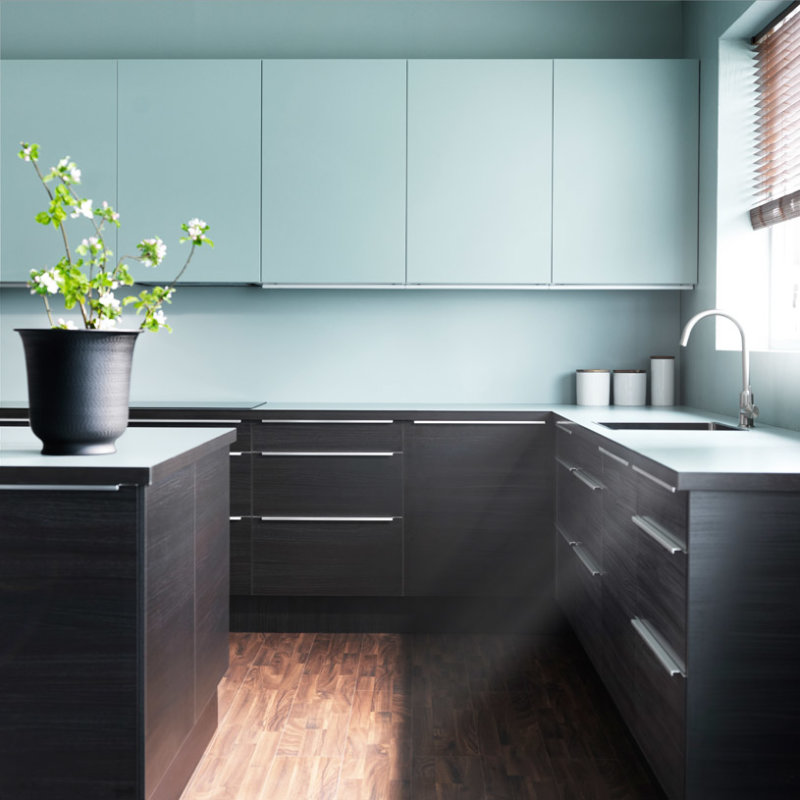
Modern style is concise and does not endure frills
If a turquoise kitchen set is chosen for a modern interior, then it is better to prefer the option in which the front planes of the cabinets are made in gloss and the color is as dark and saturated as possible. The most neutral floors, walls and ceiling, which can have such colors as:
- white;
- Gray;
- the black;
- neutral taupe.
It is important to remember that in a modern interior you should make one bright color spot and surround it with the most neutral colors and surfaces made of synthetic materials.
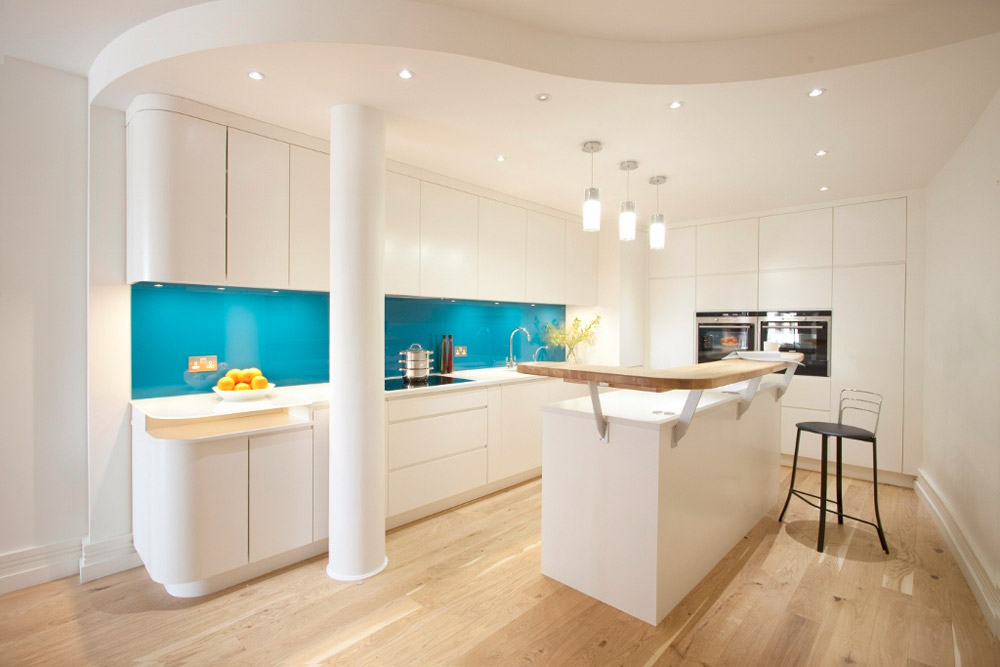
Modern snow-white kitchen with a turquoise apron
Another option for using turquoise in a modern interior is the use of turquoise ceramic tiles on the apron of the work surface. It is important to observe the following rule - no floral or lace patterns on the surface of the ceramic. The only ornament that can be applied is geometric elements, which are expressed not due to color, but due to texture. That is, for example, matte peas or lines of the same color are applied on a glossy turquoise tile.
Modern
Making a turquoise kitchen in the Art Nouveau style requires glossy and maximally rounded surfaces. Here, unlike the modern style, there are no strict angular lines, everything should be smoother and softer. Therefore, choosing a kitchen set turquoise, you should give preference to those that have rounded corners. The front surfaces of the facade should not have carved elements. But prints in modernity are desirable, to complete the formation of the image.
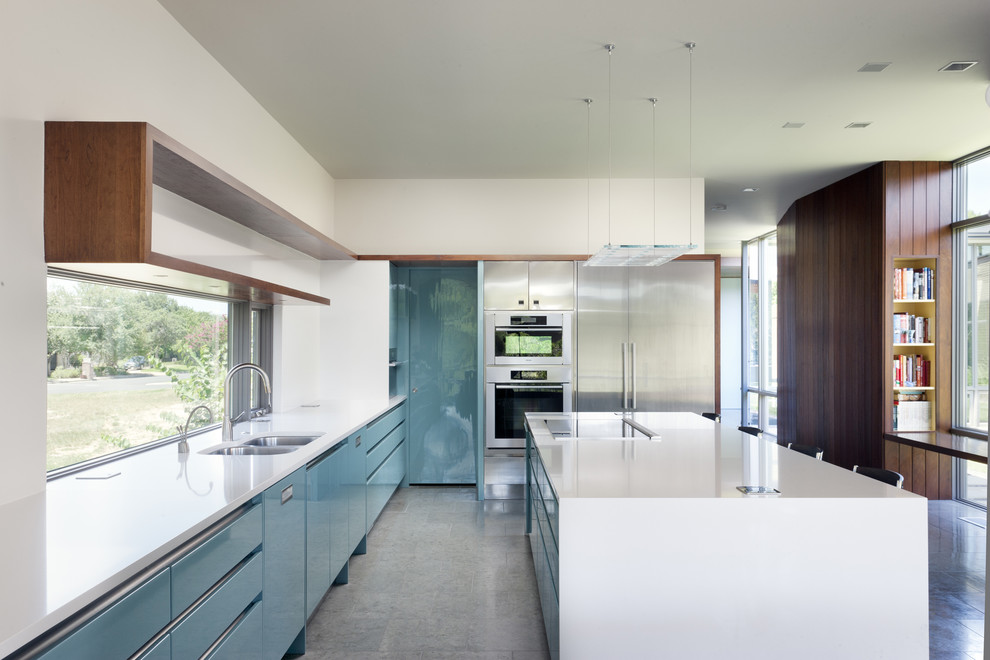
The surface of the furniture is in most cases covered with a glossy film.
Turquoise shades are best suited for marine themes or images of exotic flowers and vines. It is important to take into account the fact that the more ornate and large ornament, the better. Sometimes one large flower is enough.
For the Art Nouveau style, you can also choose a turquoise ceiling. If it is carried out using a tensile structure, then any pattern can be applied to the PVC film. Suitable 1 large image, located asymmetrically, relative to the center.
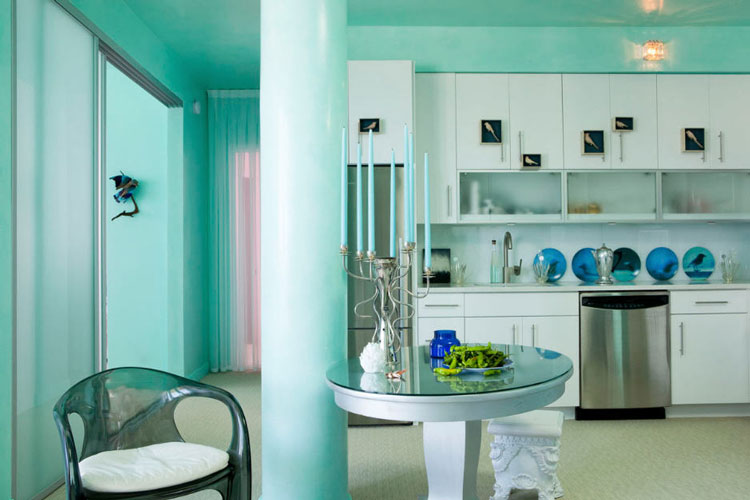
The turquoise ceiling is suitable for a room of a sufficiently large size with good natural light.
You can also make the floor of bulk polymer or artificial stone in shades of turquoise.
Since the blue-green hue itself is very intense, you should not use it too much. It will be enough one, large in its surface area.
Provence
When implementing the Provence style, shades of turquoise should be muted as white as possible. You can use those that tend to the green part of the spectrum, that is, have greater warmth. If we talk about the saturation of tones, then they should be inclined to pastels. They are best used on wooden surfaces of furniture, textiles, walls and utensils.
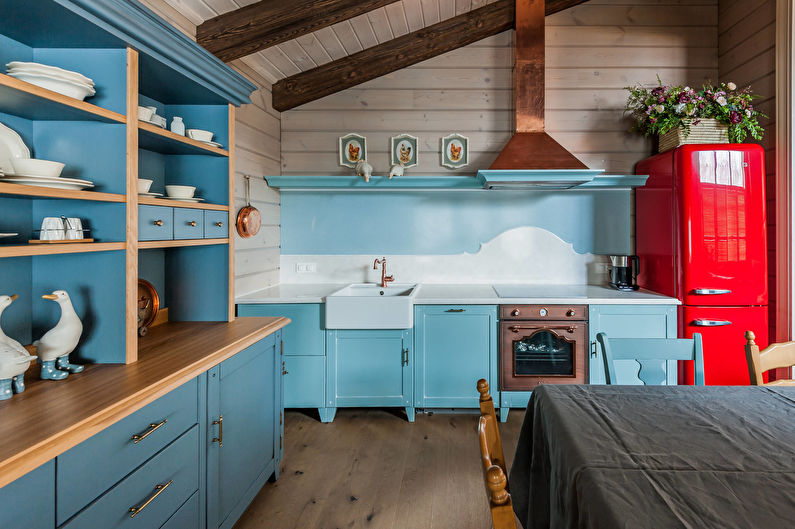
A light matte shade of sky is best suited for Provence.
A tree painted in turquoise should not have a pronounced sheen, and even less varnish. The opposite principle works here. The naturalness and texture of the wood should be “readable” even behind a layer of paint. If we talk about textiles, then a small floral ornament is best suited for the Provence style. It can appear on curtains, seat cushions, tablecloths, napkins.
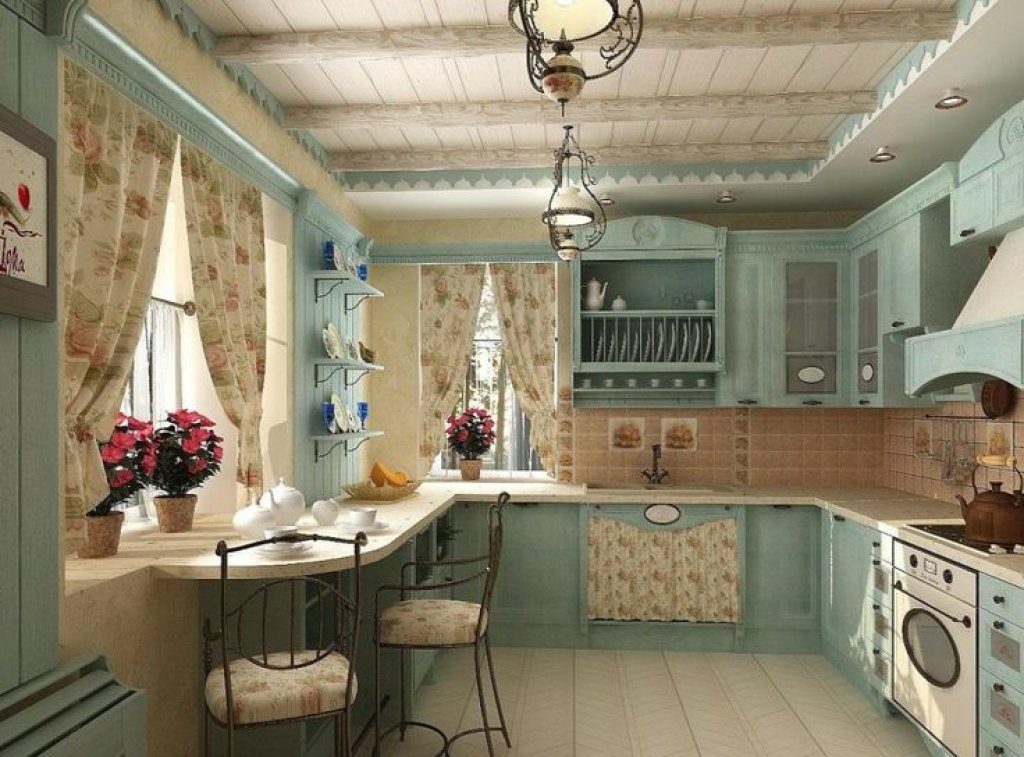
Natural tones are selected as companions - light wood, beige ceramics and curtains made from natural fabrics
For this design, turquoise should be surrounded by white, beige, natural shades of wood and clay, pink and peach.
Scandinavian
For the Scandinavian style, you should choose the coldest turquoise tone in which there should be more blue, not green. But at the same time, they should not differ in too intense saturation. It is better to prefer light or medium tones in saturation.
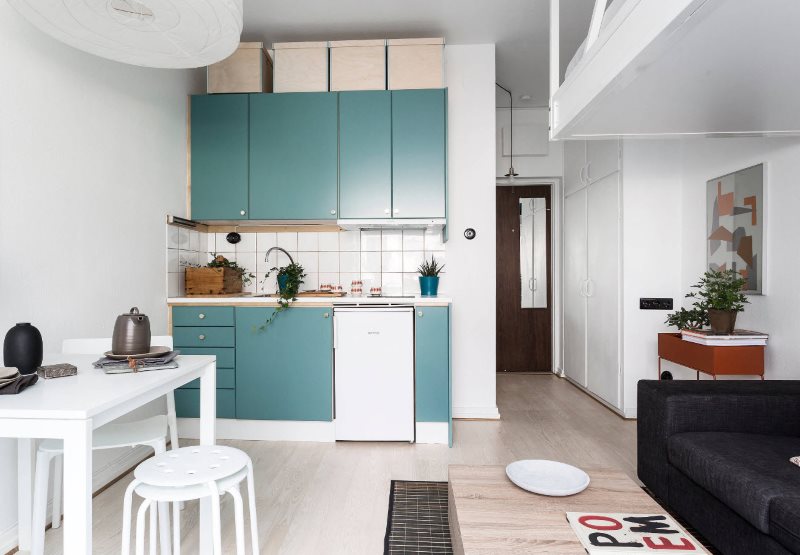
Against the snow-white background of the walls, the turquoise set looks neat and restrained in the north
The blue-green Scandinavian style headset will complement perfectly with light walls and ceilings. As a floor covering, you can choose either tile or wood in natural tones, namely gray-brown tones.
If we talk about the form of furniture, then it should be extremely concise, but at the same time functional. Excesses and delights are not welcome.
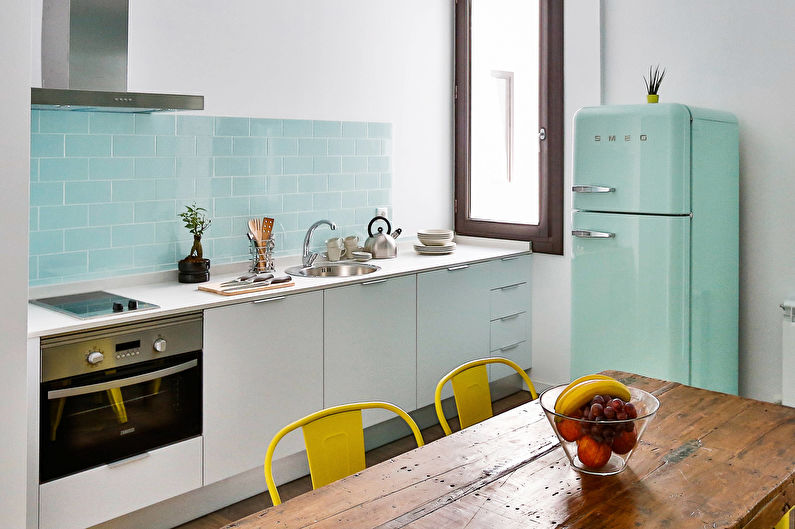
To brighten up the cold interior, the Scandinavians add some cozy textures - a varnished wood or a couple of bright accents
What you need to pay special attention to in the Scandinavian style is the lack of textile design of the windows. This is due to the fact that the decision of the room involves a large amount of light inside the room. In order for nothing to interfere with the light, the windows in the rooms of the Scandinavian style do not curtain anything. But to protect the inside of the room from the outside world, the Scandinavians use either Roman curtains, or, in extreme cases, the use of light transparent tulles is allowed.
What color does turquoise combine with?
Turquoise is quite moody, in terms of combination with other tones. If the companion is not selected correctly, then blue-green can acquire an unpleasant hue. Therefore, in order to avoid such unpleasant moments, one should clearly imagine what successful color harmonies for turquoise can be realized for different styles.
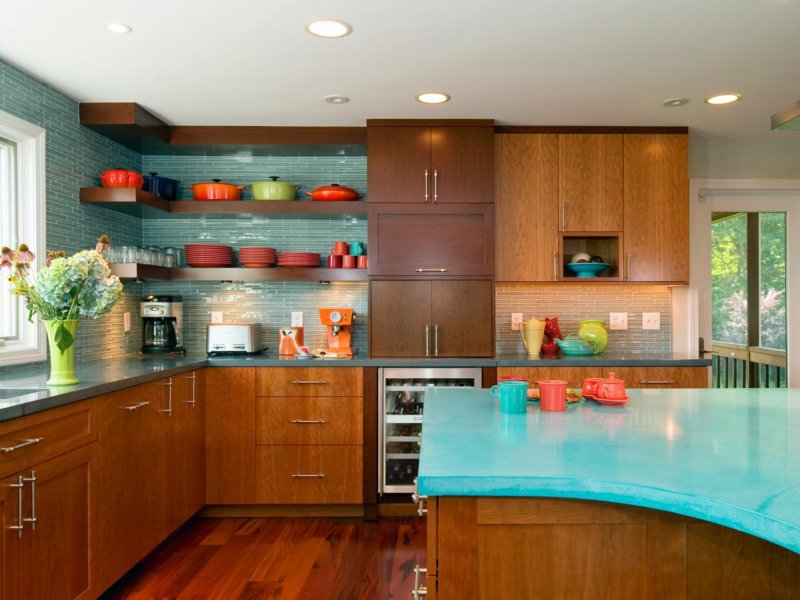
Turquoise forms natural combinations with many colors, changing its character depending on the partner
White
White is perfect for any turquoise tone. He perfectly shades it, allowing it to open with full force.
Ideally, when the turquoise kitchen is placed on a white background and has a white countertop. Also often manufacturers of kitchen furniture offer a ready-made combination of these colors, for example, a white top and a turquoise bottom.
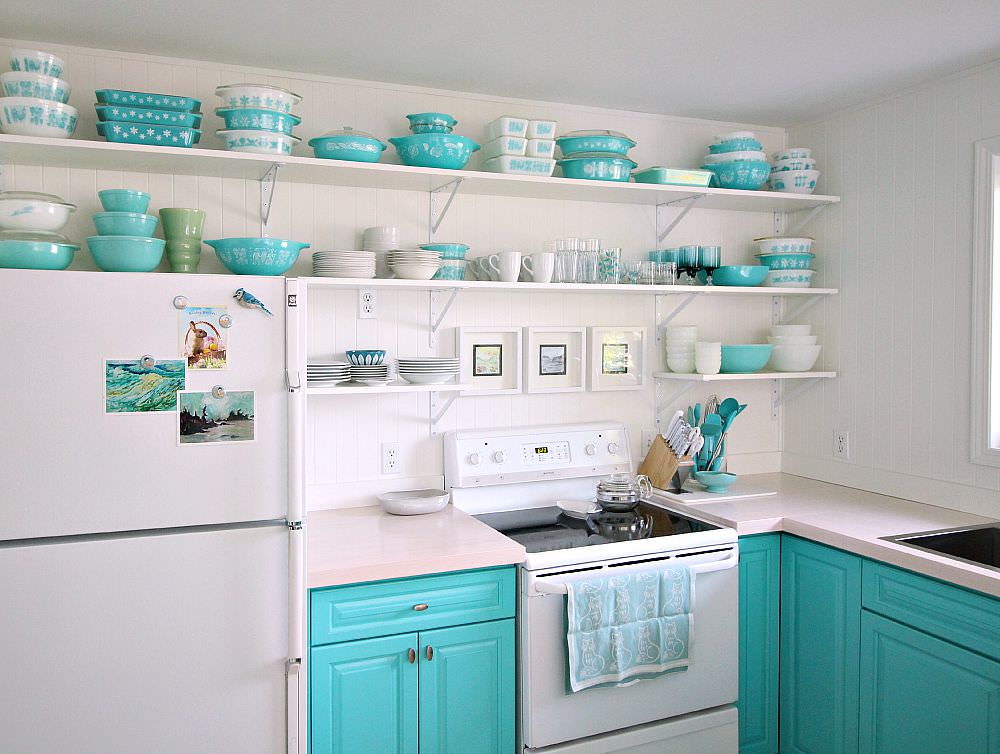
White and turquoise cuisine simply radiates lightness and freedom
This color combination is suitable for all the above styles.
Gray
Gray in combination with turquoise forms a coloristically correct attitude. But such a combination is suitable only for modern and Scandinavian styles. If the kitchen is not lit enough, then the room in such tones may be too gloomy. Therefore, it would be better if the windows of the gray-turquoise kitchen overlook the sunny side.
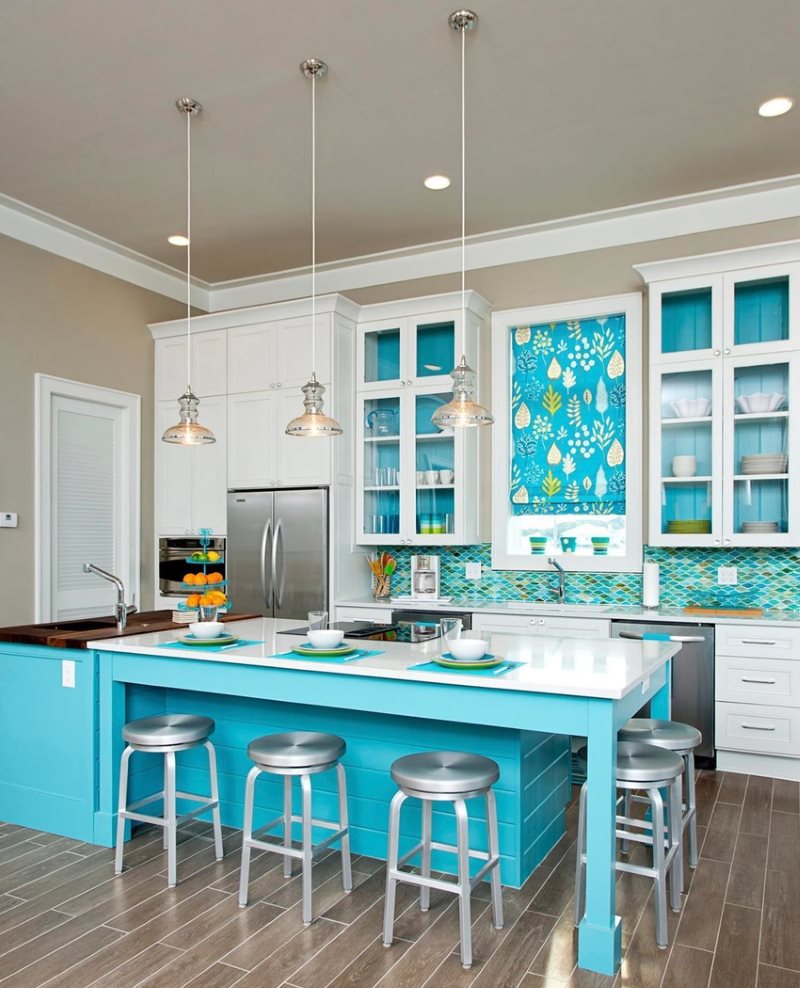
A successful combination of gray, white and turquoise colors in a stylish modern kitchen
Pearl
White shades also work well with turquoise, such as:
- lactic;
- pearl.
They form softer but equally harmonious combinations both for the Scandinavian style and for Provence and Art Nouveau.
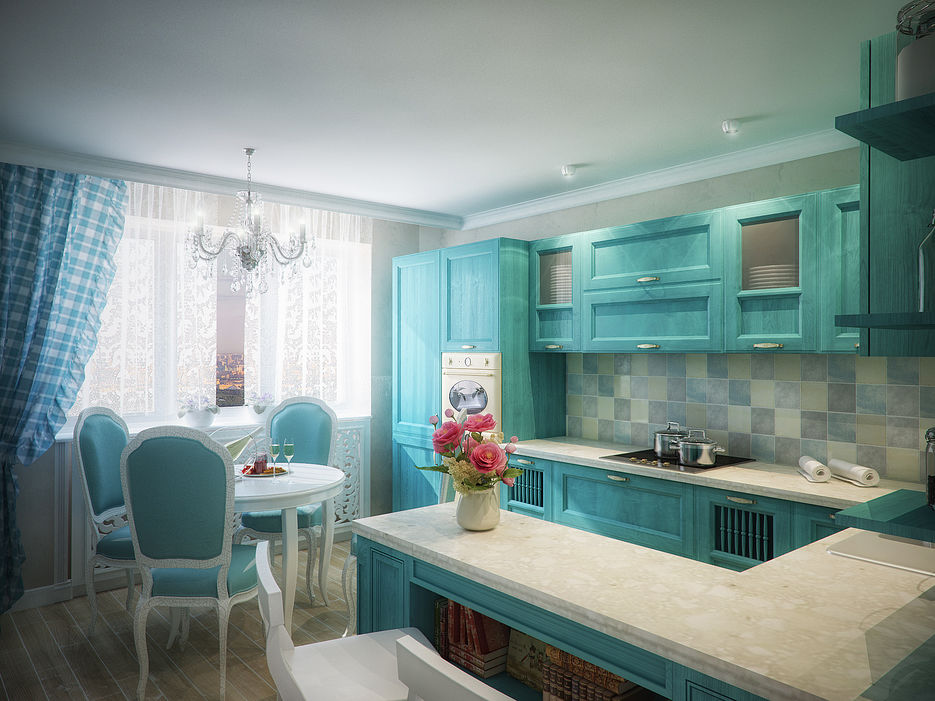
Cozy kitchen with a breakfast bar and a separate dining area
Beige
Beige will suit a blue-green range if there is no yellow in its tone. Warm beige shades are best suited for a greener turquoise. Whereas gray-turquoise shades form a harmony with bluish shades.
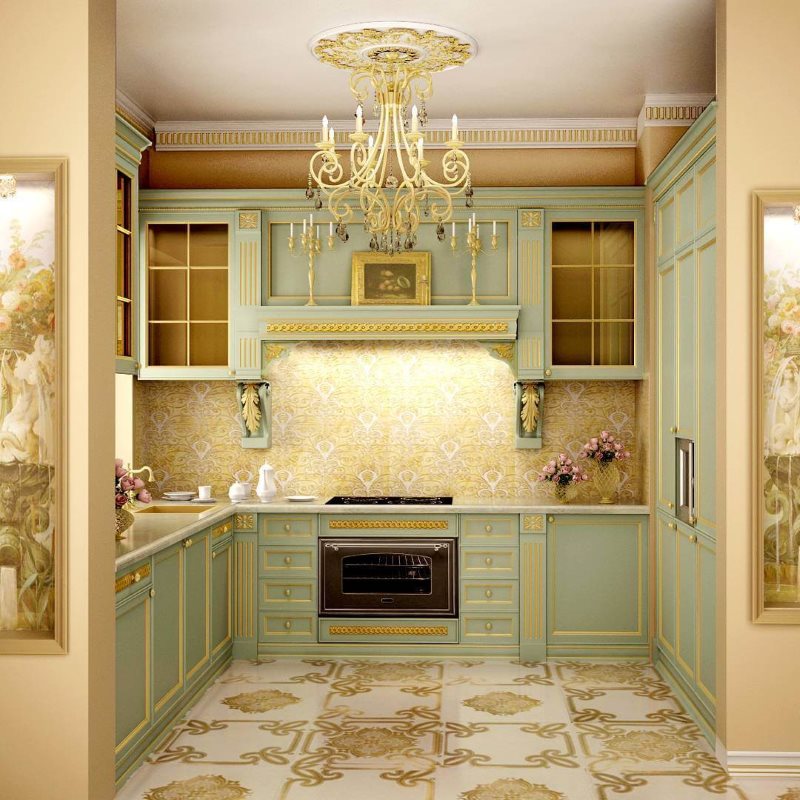
Turquoise and beige classic style kitchen
Among beige tones should be preferred:
- ivory;
- neutral beige;
- champagne;
- vanilla.
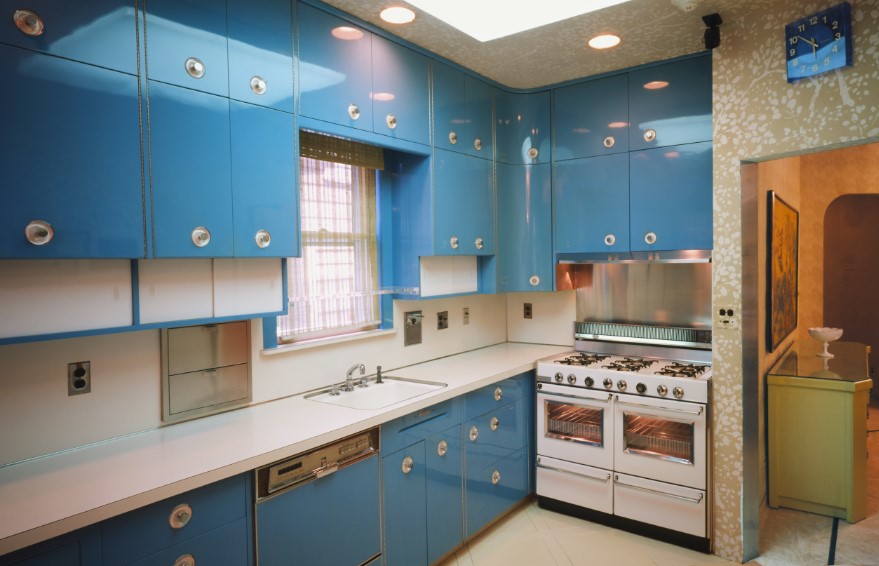
Modern kitchen in turquoise and beige tones
Features of finishing turquoise cuisine
Choosing the finish of certain surfaces of the kitchen premises, it is worth considering its style. It determines the types of textures and materials that will be applied.
How to make a floor
The kitchen floor can be tiled. Its color scheme can be natural (like stone or wood texture). This solution is suitable for the Scandinavian style and Provence.
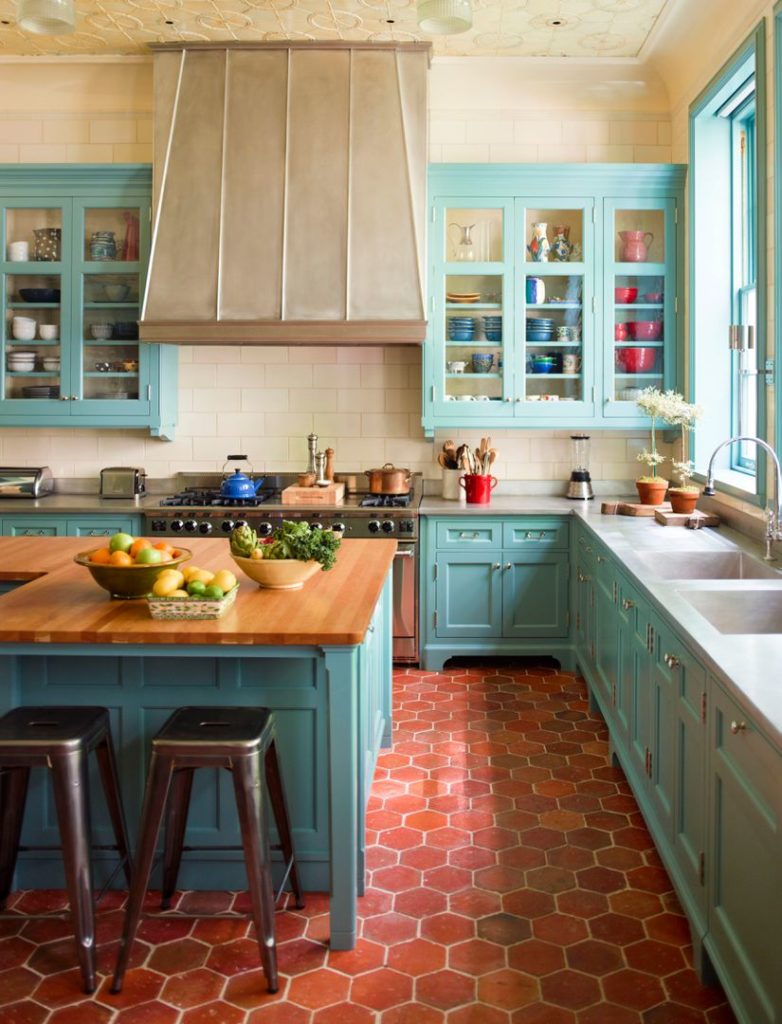
Kitchen provence with ceramic stone flooring
But for the modern style, bulk floors are better suited, which can be made of any shade of turquoise.
What wallpaper and materials to choose for the walls
When decorating the walls for the kitchen, it is important to consider the functionality of the room. The working surface, the so-called apron, must be lined with either tiles or plastic panels. It is not only convenient, but also practical. Since this surface is most often exposed to various types of pollution.
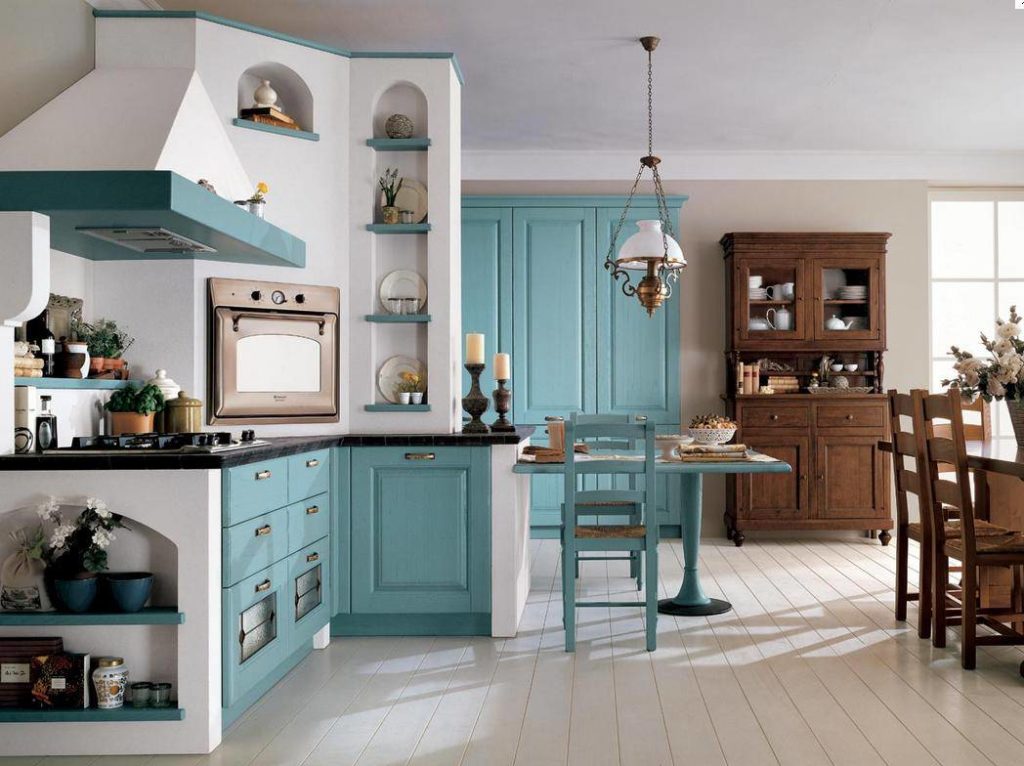
In the kitchen, most of the walls can be simply leveled and painted in a calm color.
Plastic panels are best used for modern and Scandinavian styles. But in order to correctly place accents in the style of Provence and Art Nouveau, it is better to choose ceramic tiles. It can be either plain white or turquoise, or combine ornamental motifs in a suitable color scheme.
The turquoise walls in the kitchen can be wallpapered or painted with a suitable color. In any case, the size of the room should be considered. If the dimensions of the kitchen are small, then the color of the walls should be as light as possible, preferably white or in shades of beige. This will help visually expand the space.
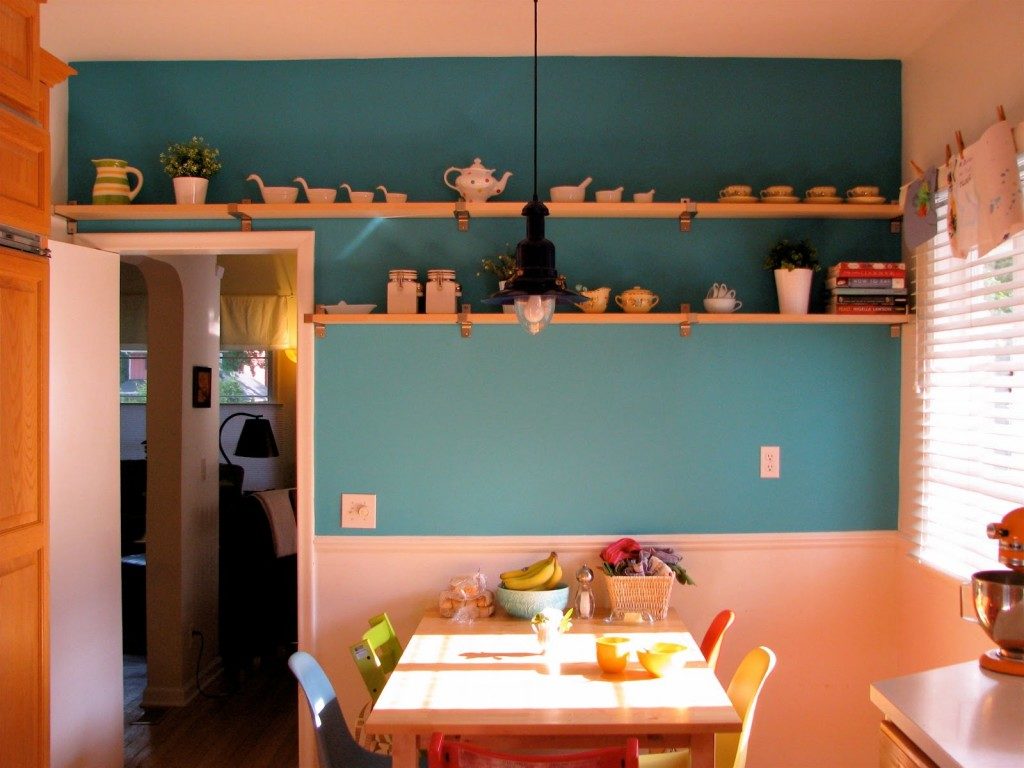
Against the background of the turquoise wall, dishes placed on open shelves in white or beige color look good
For all styles except Provence, it is advisable to use monophonic wall decoration. But in the Provence style, you can apply wallpaper with a small patterned pattern.
Wallpaper for the kitchen itself is desirable to choose with surfaces that are resistant to wear and allow wet cleaning.
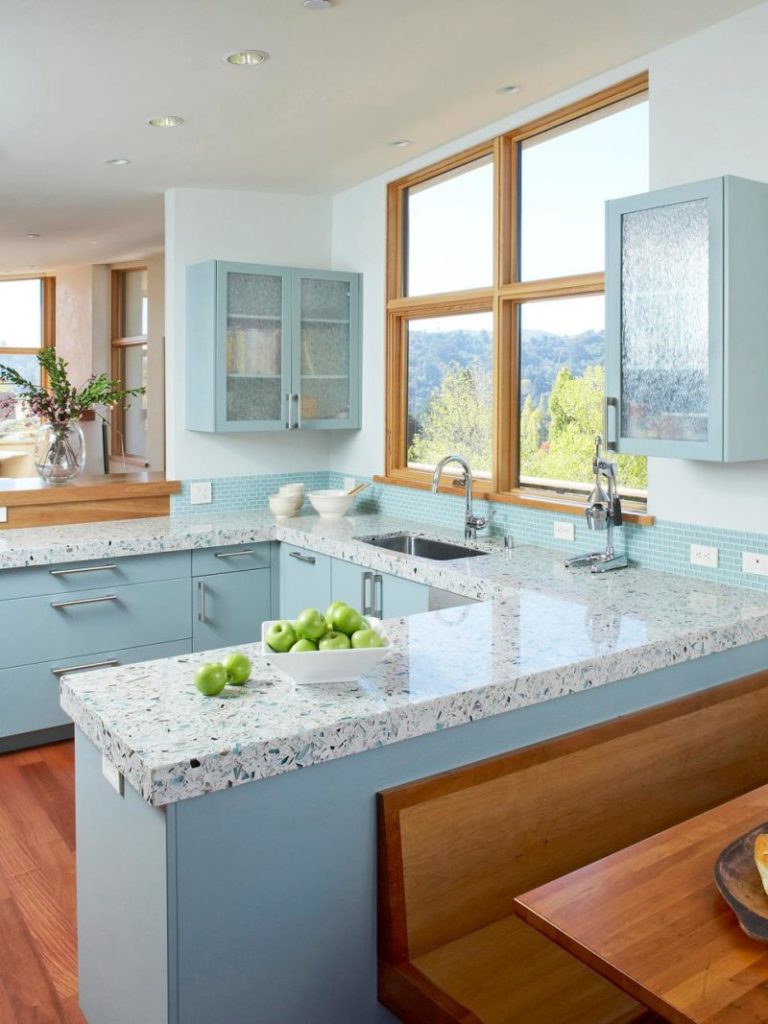
A good option for wall decoration will be washing wallpaper or fiberglass for painting
Ceiling in a turquoise kitchen
The turquoise kitchen will look fresher and lighter if its ceiling is as neutral as possible, for example, white, beige or pearl color.
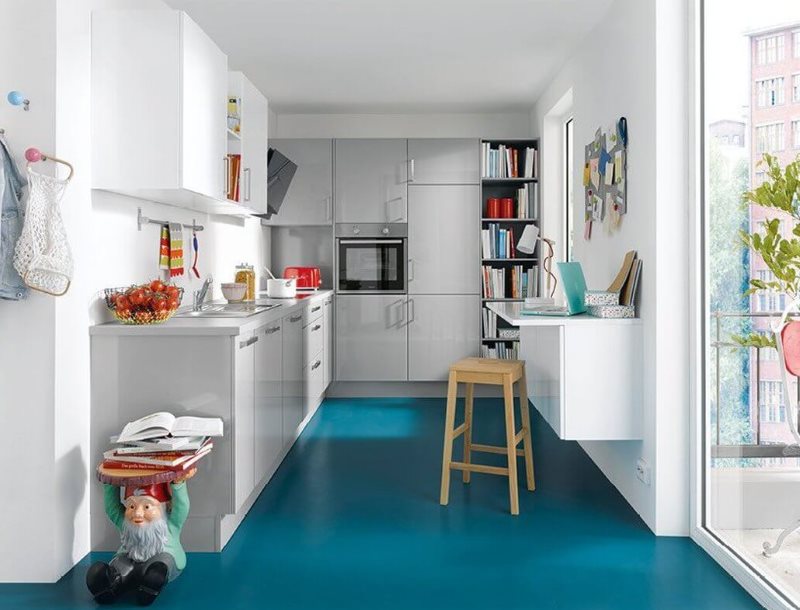
White ceiling will be the best solution for a small kitchen
The material for the ceiling can be selected either paint or whitewash, or stretch PVC.
Apron, tabletop, decor
For the apron, you can choose the following finishes:
- ceramic tile;
- mosaic;
- plastic panels.
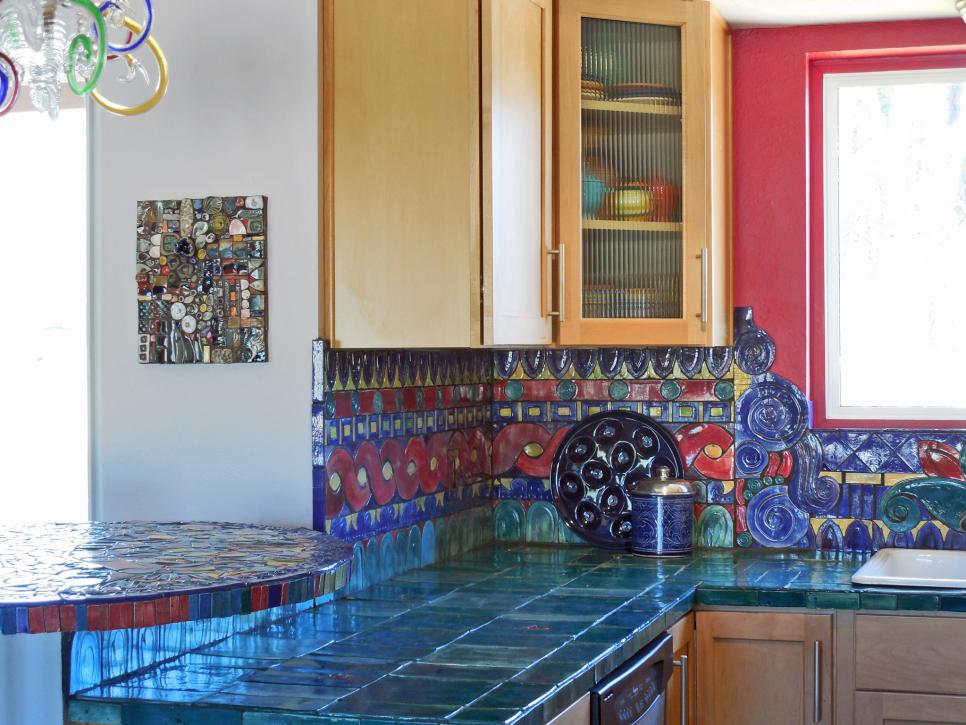
Tiled mosaic panel with a pattern - design for lovers of a bright and spectacular interior
For the Art Nouveau style and for the modern style, you can recommend:
- plastic panels;
- a mosaic with a silver metal effect;
- mosaic with a glass effect in turquoise-white tones;
- plain tile.
For Provence style, it is best to use ceramic tiles with a plain surface, or with a small floral ornament.
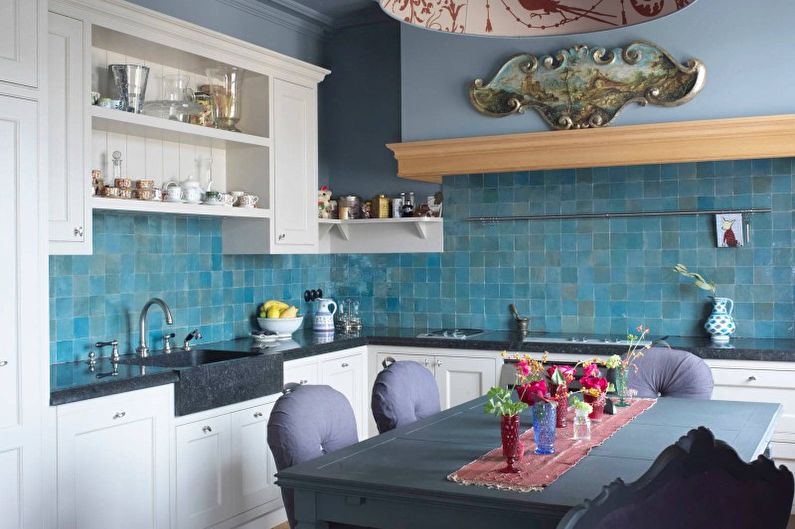
Materials for the apron can be used different - tiles, glass or plastic. The main thing is that the surface is easy to clean
The countertop is better to choose from natural or artificial stone. It has high performance.
Lighting and kitchen appliances
In order for turquoise not to get too cold, you should choose a warm color for lighting in the kitchen.
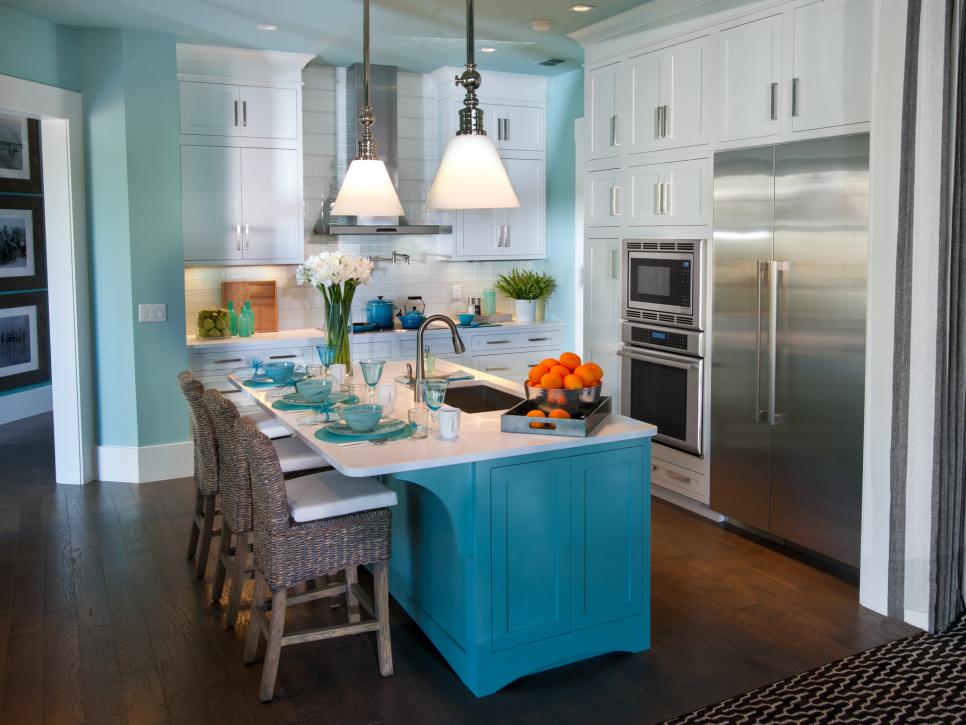
The design of the fixtures must match the style of the kitchen
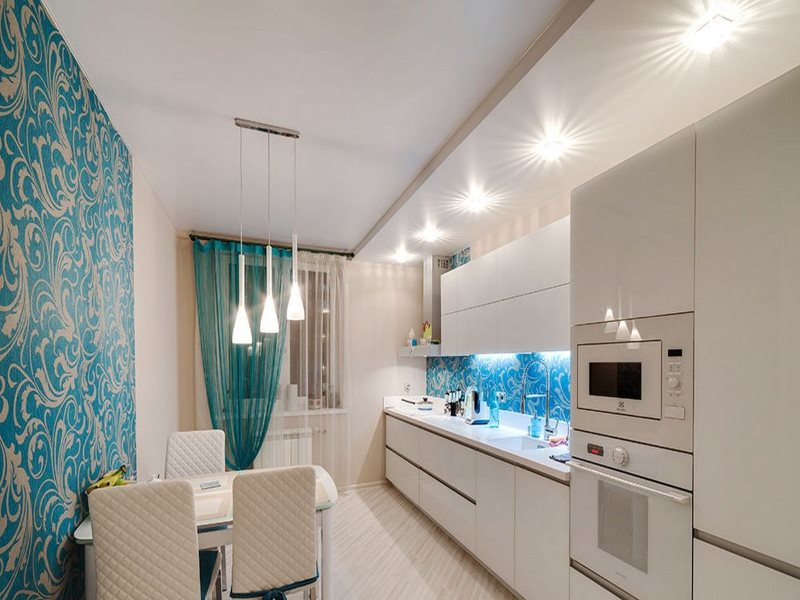
Particular attention is paid to illuminating work surfaces.
Kitchen appliances are best used with metal chrome or matt surfaces. An interesting combination will turn out if you add a bright color spot to the red appliances of household appliances in the kitchen.
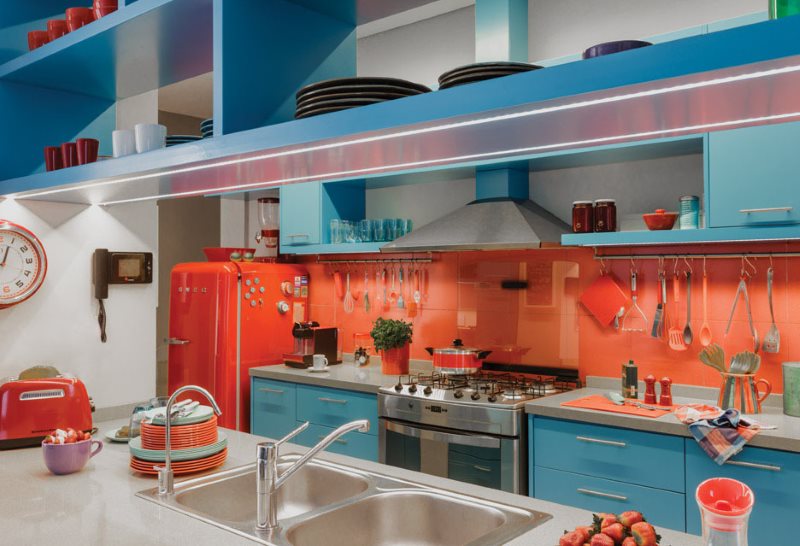
Nowadays, it has become fashionable to equip the kitchen with retro appliances
Video: Turquoise Kitchen Design
Photo gallery
In order to imagine all the options for turquoise cuisine, you should consider all the photos presented.
